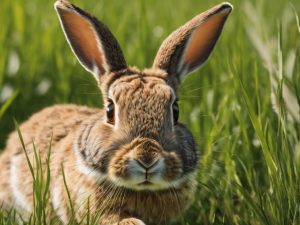Can Rabbits Eat Couch Grass? Preparing & Serving Tips for a Balanced Diet
Couch

Understanding Couch Grass
Growing primarily in the Northern Hemisphere, couch grass is recognized by its long, creeping rhizomes that make it particularly resilient and sometimes challenging to remove once it has settled in a garden. These underground stems allow it to spread rapidly, often overtaking other plants in its vicinity.
Can Rabbits Safely Consume Couch Grass?
Yes, rabbits can eat couch grass. In the wild, grasses form the most substantial portion of a rabbit’s diet. Their digestive systems are equipped to break down the fibers found in grasses efficiently. Therefore, couch grass, like other types of grass, can be safely included in your rabbit’s menu.
How Much is Just Right?
When it comes to the quantity of couch grass, follow these general guidelines:
Introduce Gradually
As with any new addition to your rabbit’s diet, it’s vital to introduce couch grass slowly. This ensures they adjust well without any adverse digestive reactions.
Monitor Their Health
Be observant. If you notice any changes in their droppings or behavior after introducing couch grass, it might be a sign to adjust the quantity or remove it from their diet temporarily.
Fresh Grass is Best
Always ensure that the grass is fresh and has not wilted or turned brown, as stale or rotting grass can cause health problems.
Benefits of Couch Grass
Couch grass isn’t just another green thing; it offers some tangible benefits:
- Fiber: Essential for a rabbit’s digestive system, fiber aids in smooth digestion and prevents issues like gastrointestinal stasis.
- Hydration: Fresh couch grass contains moisture, which can help in keeping your rabbit hydrated, especially during warmer months.
- Vitamins & Minerals: Grasses generally contain a variety of vitamins and minerals beneficial for a rabbit’s overall health.
Potential Concerns and Warnings
Before you start plucking those blades of couch grass and feeding them to your rabbit, keep in mind the following:
- Pesticides & Chemicals: If your garden or lawn has been treated with chemicals, avoid feeding the grass from that area to your rabbit. These chemicals can be harmful and sometimes lethal.
- Overfeeding: Even though rabbits thrive on a diet rich in grass, variety is key. Overfeeding any single type of grass, including couch grass, can lead to nutritional imbalances.
Exploring Alternatives and Fruits
Although couch grass can be a healthy addition to your rabbit’s diet, it’s crucial to maintain a balanced diet with various foods:
- Other Grass Types: Timothy
, meadow hay, and are all great alternatives to couch grass. - Vegetables:
like , , and bell can be added for variety and extra nutrients. - Fruits:
should be seen as treats rather than regular diet staples due to their high sugar content. (without seeds), , , and are some of the fruits your rabbit might enjoy in moderation.
In essence, couch grass can be a delightful treat for your rabbit when sourced responsibly and given in the right quantities. Remember always to ensure your rabbit has a balanced diet and that any changes in their food are introduced gradually. The golden rule is to observe and adjust based on your rabbit’s behavior and health. Their well-being and happiness are always worth the effort!
Nutrition for Rabbits
References
- www.gov.pe.ca – 4H Rabbit Resource Guide
- riseandshinerabbitry.com – Naturally Feeding Rabbits
- ncbi.nlm.nih.gov – Rabbit Feeding and Nutrition: Practical Implications
- kb.rspca.org.au – What should I feed my rabbits?







Leave a Reply